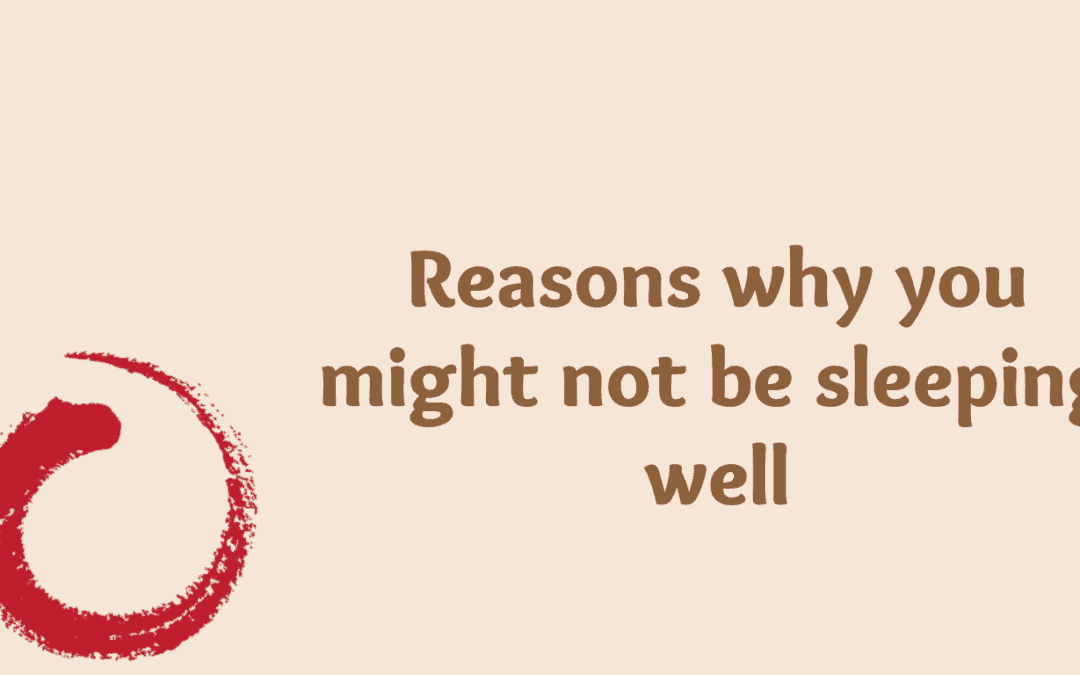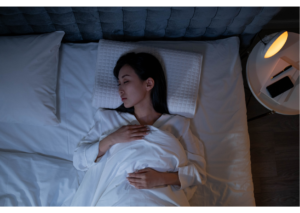Do you sleep well?
It might surprise you to know just how many people don’t sleep well.
In Chinese Medicine, asking questions about people’s sleep gives us lots of information about their health.
“Not sleeping well” can mean very different things to different people.
It can mean:
- It takes you a long time to fall asleep.
- You are very sensitive to sound and are easily startled out of your sleep.
- You fall asleep quickly but wake up frequently during the night.
- You wake up in the night feeling too hot and sweaty.
- You have lots of vivid dreams or nightmares that leave you feeling exhausted when you wake up.
- You wake up feeling exhausted and heavy even if you have had a solid 8-10 hours of sleep.
This is not an exhaustive list by the way, but they are some of the common things that people report about their sleep when asked a few detailed questions.
In Chinese Medicine, sleep is so important because it is when a person replenishes their yin energy. Yin energy is the fuel source of our Yang energy. Another way to say that, is if you want to do any kind of activity at all (yang), you need adequate yin to do that.
If you have ever experienced some kind of sleep deprivation you know exactly what I am talking about. That horrible out of body feeling is not conducive to a productive day!
It is very easy for articles like this to instigate a self-diagnosis of the kind of Chinese Medicine pattern you might have, that explains your insomnia or sleep issues… so I must stress that if you are called to investigate your sleep issues through the lens of Chinese Medicine, please do make an appointment to see a professional TCM practitioner so they can diagnose you properly.
In the meantime, here are some pretty major factors that can affect your sleep:
Too much coffee ☕️
We all know this.
Caffeine has a half-life of forever, and the further into the day that you are consuming caffeine, the more likely you are to have that moment when head hits the pillow, your brain says (with a bit of background circus music playing) “I am wide awake, and falling asleep could take ages tonight!”
I remember when I was still studying and was practicing my acupuncture skills on willing friends and family from home. Some nights when I had somebody penciled in to come over for acupuncture, I would make myself a coffee (third one of the day) at the shameful hour of 6pm!
At the time, I felt like it was only way to “push through”, and then, when I went to bed, big time regrets! Even so, that was a bad habit that I did on numerous occasions.
A nod, once again to this cultural conditioning of just wrecking yourself to get more things done at the expense of rest and repair.
Tip: It is possible for you to cut back to 1 x coffee per day. Find another hot drink as a substitute for when you would reach for another coffee. Good substitutes include bone broth, some kind of mushroom blend, herbal or even a black tea.
Eating too much before you go to bed 🍜
Overeating can be a major reason that a person’s system is not functioning well. I fully appreciate the layers of emotional complexity when it comes to eating and overeating.
In Chinese Medicine, and in Western Medicine, the Liver has an enormous list of jobs to do in the body. Overnight, the liver really wants to be freed up so it can do its job of cleaning and cleansing the blood overnight. It is a highly vascular organ, and another of its major roles is storing blood as well as cleaning blood.
So, if a person has had a huge meal quite late in the evening, maybe throw a few beers or glasses of wine in the mix as well the liver is not going to be able to tend to its blood cleaning chores, until its role in the digestive process has worked its way through that meal.
Of course, from time to time, we all have indulgent nights. It is not the purpose of this article to create too much rigidity and neurosis in the way we live our lives.
Do pay attention however, to the nights when you do indulge in a big meal, or some alcohol, or that third coffee at 6pm, and notice if your body wakes you up sharply, sometime between 1 and 3am. This is the time of the liver (when it wants to be freed up and cleaning blood). If you are being woken up at this time, it means that the qi flow moving through the liver and the liver network has been disrupted.
Also notice if you wake up really hot, or thirsty. This means that there has been some heat generating, possibly from the meal and the alcohol, and the body is too hot and needs to cool down.
Tip: Try to have at least 2-4 hours of time between eating your dinner and going to bed. This helps the body in its digestive processes before you go straight to bed on a very full stomach.
Not having any decompression time after your day 🧘♀️
How do you wind down?
There are textbook, sensible, mindful ways of winding down, and then there are the other ways.
Is drinking 2-3 glasses of wine and numbing out on Netflix before crashing to bed the best way to decompress? Maybe, maybe not, but I fully appreciate that at the end of a long (and maybe a very irritating day), this option is way easier than sitting down to a caffeine-free herbal tea and journaling about your day.
We take in impressions all day long. Every conversation, every sight and sound, even the emotions of the people around us (especially if you are in the camp of highly sensitive people).
A workplace full of tension, the feeling of agitation from a group of co-workers that do not mesh well, or the stress of your job, needs some way to be released from the mind and body. I’m sure you know this, and are trying to find ways of doing this exact thing so that your time at home is relaxing and free of workplace associations.
I don’t recommend too vigorous a workout late in the day (as it will spike your cortisol and maybe mess with the balance of your melatonin), but an after-work walk, can be a helpful way of decompressing. A walk will use your body and your breath to help clean out some of the impressions from the day before you take them straight into your dreams (and maybe your overnight teeth grinding!). Anyone reading this who has a dog, will appreciate that even though you may not always feel up to going on the evening dog walk, it certainly does wonders for helping to clear out the body and the mind.
Tip: Dog or no dog, try going for a gentle walk after you get home from work for one week and see how you feel.
Going to bed very late 😴
“They” say, that for every hour that you are asleep before midnight, equates to four hours’ worth of rest. Read that again.
Are you a night owl? You may have trained yourself to be that way. I know lots of mothers with young children that get most of their work done late at night when the household is asleep.
It’s not an easy juggle to balance the life/work thing. I get it.
But if you are someone who is having some sleep struggles, it might be helpful to have a trial period of being in bed by 9:30pm for a week or so (if you can), and see if it makes a difference to how you feel during the day.
Way back in the day I used to work in hospitality. I didn’t finish as late as I know some hospitality workers did, but even so, on a busy weekend night it was quite standard for me to get home and into bed no earlier that 1:30am.
The best thing I ever did for my health (once I was able to fully step out of my hospitality work), was to go to bed at 9:30pm every night. That works for me, and I don’t have kids so it was probably a lot easier than other women with more on their plate. If I try and work late into the evening, my brain and body literally say to me “no, we are not doing this, go to bed”, so I really don’t have a choice!
In Chinese Medicine it is hard to have a hierarchy of organs of importance, as they are all fabulous and much needed, but I have to say the kidneys (you could say the adrenals here if you like), are super important for daily life and longevity.
The notion of going to bed earlier is definitely one aspect of preserving and conserving the vital essence of the kidneys, rather than burning the midnight essence oil well into the yin time of the night.
Tip: give yourself a trial period of going to bed earlier for a week or so. You may need to read a book, listen to Sleep stories & Podcasts or do a yoga Nidra in bed as you change your routine, and then see if it has made any differences to your health (feel free at the end of your trial period to make this a new habit).
There is a lot that Chinese Medicine can offer in the way of acupuncture, herbs, and food therapy that would supplement this article really well. So, if this did not quite answer your question or address your specific sleep issue, consider finding a Chinese Medicine practitioner in your area to help support you on your way to getting deeper and better sleep.


